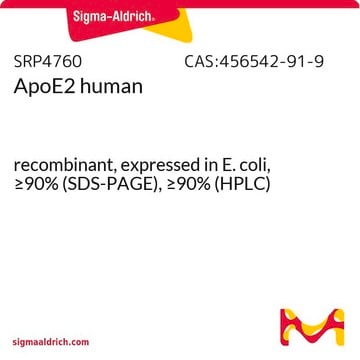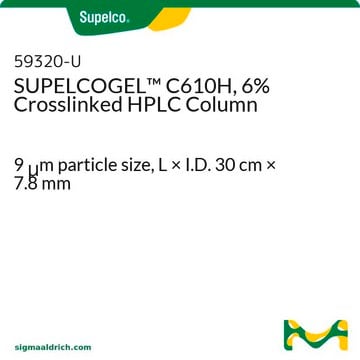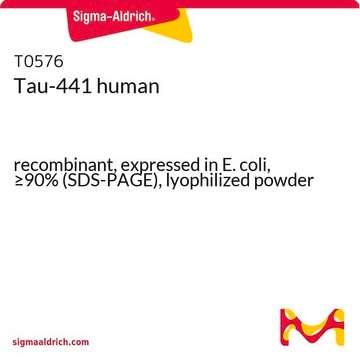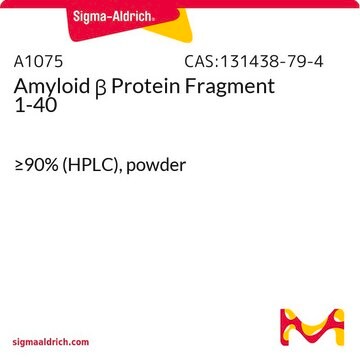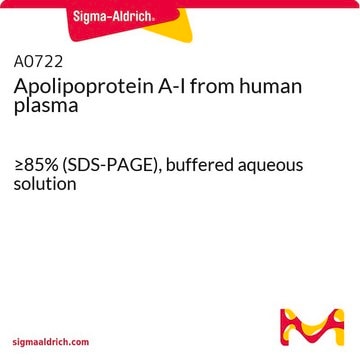Összes fotó(1)
Fontos dokumentumok
A3234
Apolipoprotein E4 human
recombinant, expressed in E. coli, ≥90% (SDS-PAGE and HPLC), lyophilized powder
Szinonimák:
ApoE4
Bejelentkezésa Szervezeti és Szerződéses árazás megtekintéséhez
Összes fotó(1)
About This Item
Javasolt termékek
rekombináns
expressed in E. coli
Minőségi szint
Teszt
≥90% (SDS-PAGE and HPLC)
form
lyophilized powder
UniProt elérési szám
tárolási hőmérséklet
−20°C
Géninformáció
human ... APOE(348)
Looking for similar products? Látogasson el ide Útmutató a termékösszehasonlításhoz
Általános leírás
Apolipoprotein E (ApoE) is present in the brain and is mainly produced by astrocytes. It is a 299 amino acid glycoprotein of 34kDa. It is present in all classes of lipoproteins except LDL (low-density lipoprotein). APOE gene has three alleles, such as APOE ε3, APOE ε4 and APOE ε2. It is located on human chromosome 19q13.
Biokémiai/fiziológiai hatások
ApoE4 (apolipoprotein E4) is associated with AD (Alzheimer′s disease).
Apolipoprotein E4 is a member of the apolipoprotein E family of plasma lipoproteins that bind reversibly with lipoprotein and play an important role in lipid metabolism. ApoE4 regulates plasma lipid levels by increasing the degradation of particles rich in triglycerides and cholesterol. In addition to facilitating solubilization of lipids, these proteins help to maintain the structural integrity of lipoproteins, serve as ligands for lipoprotein receptors, regulate the activity of enzymes involved in lipid metabolism and bind amyloid-β protein, the major component of plaques in Alzheimer′s disease, which it delivers to the microglia, the major scavenger cells of brain. Individuals heterozygous for the ApoE4 allele are at higher risk of late-onset Alzheimer′s disease. ApoE exists in three major isoforms: E2, E3, and E4, which differ from one another by a single amino-acid substitution. Recombinant human ApoE4 is a 34.4 kDa protein containing 300 amino acid residues.
Fizikai forma
Lyophillized from a 0.2 μm filtered solution in 20 mM sodium phosphate, pH 7.8.
Tárolási osztály kódja
11 - Combustible Solids
WGK
WGK 3
Lobbanási pont (F)
Not applicable
Lobbanási pont (C)
Not applicable
Analitikai tanúsítványok (COA)
Analitikai tanúsítványok (COA) keresése a termék sarzs-/tételszámának megadásával. A sarzs- és tételszámok a termék címkéjén találhatók, a „Lot” vagy „Batch” szavak után.
Már rendelkezik ezzel a termékkel?
Az Ön által nemrégiben megvásárolt termékekre vonatkozó dokumentumokat a Dokumentumtárban találja.
Az ügyfelek ezeket is megtekintették
Traumatic Brain Injury
Neurobiology of Brain Disorders, 120(4), 219-235 (2015)
Lipids and disorders of lipoprotein metabolism
Clinical Biochemistry, 120(4), 702-736 (2014)
Twenty years of the Alzheimer?s disease amyloid hypothesis: a genetic perspective
Tanzi R E and Bertram L
Cell, 120(4), 545-555 (2005)
Roles of apolipoprotein E4 (ApoE4) in the pathogenesis of Alzheimer's disease: lessons from ApoE mouse models
Huang Y
Biochemical Society Transactions, 120(4), 702-736 (2011)
Fatemeh Nouri Emamzadeh et al.
Neuroscience letters, 618, 146-151 (2016-02-28)
Parkinson's disease is a progressive brain disorder due to the degeneration of dopaminergic neurons in the substantia nigra. The accumulation of aggregated forms of α-synuclein protein into Lewy bodies is one of the characteristic features of this disease although the
Tudóscsoportunk valamennyi kutatási területen rendelkezik tapasztalattal, beleértve az élettudományt, az anyagtudományt, a kémiai szintézist, a kromatográfiát, az analitikát és még sok más területet.
Lépjen kapcsolatba a szaktanácsadással
